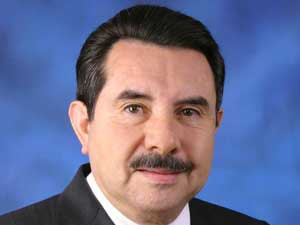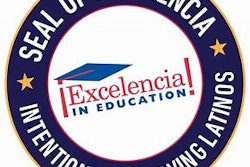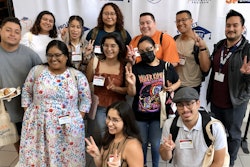The Hispanic Association of Colleges and Universities (HACU) kicked off its 34th annual conference Monday, titled “Championing Hispanic Higher Education Success: Fostering Excellence and Social Justice.”
 Dr. Antonio R. Flores
Dr. Antonio R. FloresOver four days, the virtual gathering will feature over 50 workshops, divided into six programming tracks that explore themes such as fundraising opportunities, domestic and international partnerships, higher education policy and research and best practices for Hispanic students’ academic success. Meanwhile, students will participate via their own track, the ¡Adelante! Leadership Institute, which offers over 500 students with three days of leadership and professional development training.
In the conference’s opening plenary, HACU President and CEO Dr. Antonio R. Flores acknowledged the unique time in which higher education finds itself, holding a moment of silence for the victims of COVID-19. He emphasized the disproportionate effects of the coronavirus on underrepresented communities.
“The pandemic has impacted terribly the lives of countless people,” Flores said. “It has revealed our horrific social and economic inequalities. It has heightened our rage about systemic racial discrimination, and it has also increased our awareness concerning climate change, which should be called ‘climate disaster.’”
At the same time, he highlighted the pandemic as an opportunity for higher education to tackle these societal ills with new resolve.
“Just as it’s been the case in the past, our country and the world will reinvent themselves in better and more humane ways,” he said. “And higher education will be at the forefront of that renewal, leading the way. 2020 is a year when the worst of times could lead to the best of times in our lifetime and in history.”
Flores asserted that Hispanic Serving Institutions have a critical role to play in that story, describing them as the “backbone of Hispanic success” and as a tool for economic mobility for first-generation and low-income students.
“Simply put, the more you learn, the more you earn,” he said.
He sees a connection between the rising number of established and emerging Hispanic Serving Institutions and an increase in Hispanic degree attainment. From 2008 to 2018, as the number of Hispanic Serving Institutions jumped from 280 to 539 schools, the percentage of bachelor’s degree holders who were Latinx nearly doubled.
Hispanic Serving Institutions educate about two-thirds of the Latinx students enrolled in college every year, noted Chancellor of the Colorado Community College System Joe Garcia. During the opening plenary, he was inducted into the HACU Hall of Champions, an honor annually bestowed at the conference.
“Our students depend on us, and our future depends on them,” Garcia said.
But despite Hispanic Serving Institutions’ outsized role in enrolling Latinx students, Flores stressed that these colleges and universities remain “severely underfunded” in terms of federal spending, receiving 68 cents for every dollar allotted to other institutions on average. Meanwhile, because of the economic downturn caused by the pandemic, some Hispanic Serving Institutions are struggling to survive.
He argued that it was in government’s interest to invest in these institutions developing “homegrown talent,” especially in employment areas where Latinx workers continue to be underrepresented like science, math, engineering and technology fields.
A “huge gap” also persists between Latinx student enrollment and the number of Hispanic higher education leaders, he said, highlighting La Academia de Liderazgo, a HACU program that trains Latinx scholars for executive and senior level positions in Hispanic Serving Institutions. The leadership academy welcomed its second cohort this academic year.
For Garcia, this “tumultuous” year highlights the importance of educating Latinx leaders not only in higher education but across sectors.
Today’s challenges “call out for thoughtful and well-informed leadership,” he said. Meanwhile, Hispanics make up 20% of the U.S. population and are the fastest growing and youngest demographic group in the country.
“We all know the statistics,” he added. “We provide the labor that harvests our fields, produces our food and operates our factories. However, our power cannot simply be tied to our numbers. Our real power will come when we also walk the halls of commerce and industry, of politics and media, and yes, of our educational institutions, and by gaining access to those places where we once were not welcome.”
Dr. Timothy P. White, the chancellor of the California State University System, expressed his hope in future progress. Like Garcia, he was also welcomed into the HACU Hall of Fame this year. He takes inspiration from his own experience as an Argentinian immigrant bolstered by public education in America.
“Much work remains to be done to improve access, to ensure educational equity, to promote STEM education and to permanently eradicate opportunity gaps,” White said. “But we’ll get there. We won’t rest until we do.”
Sara Weissman can be reached at sweissman@diverseeducation.com.















